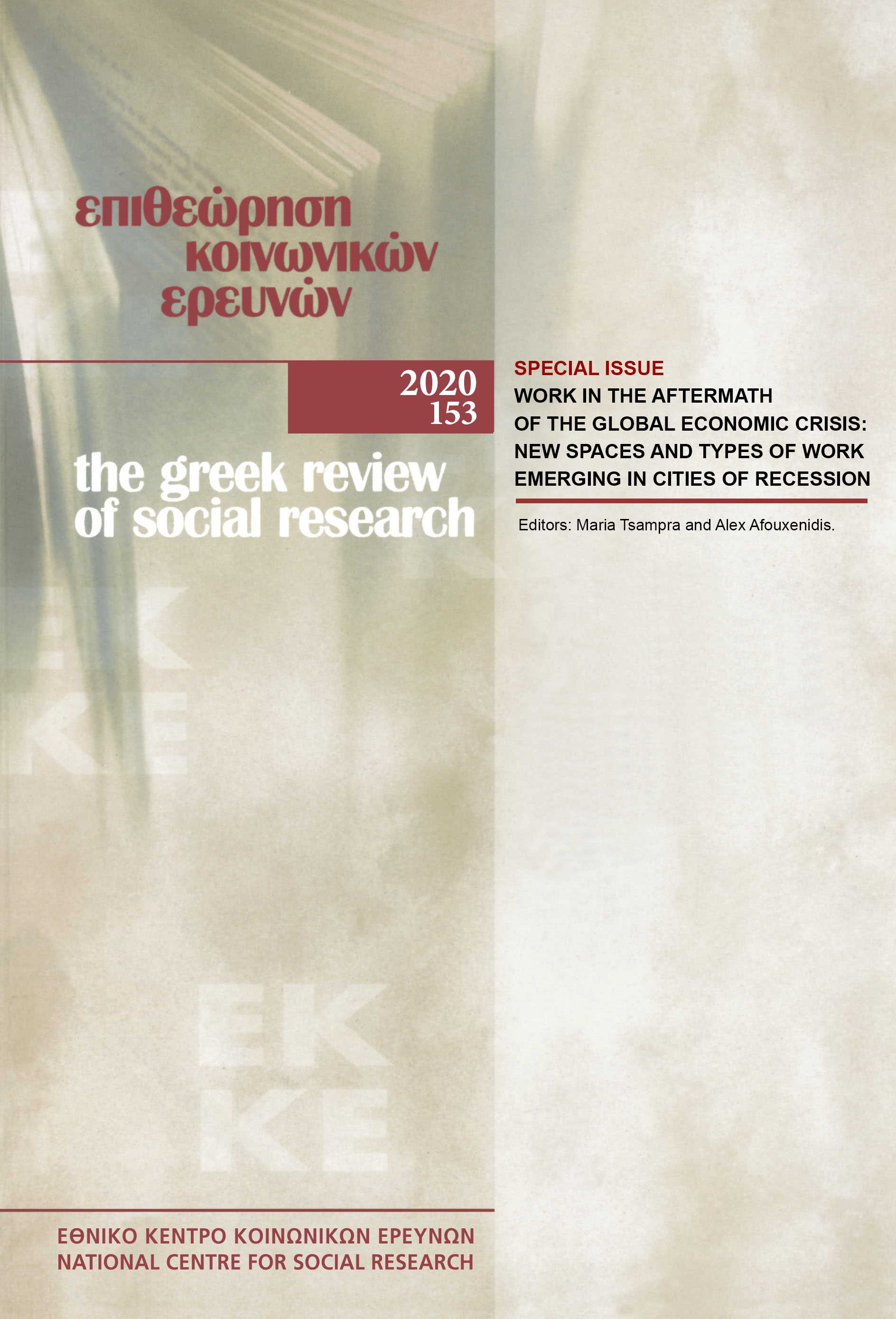Τhe symbolic economy of cities – new shapes of work and networking: Τhe role of traditional and emerging clusters of creativity in the Αthenian public space

Περίληψη
Η συμβολική οικονομία των πόλεων – νέες μορφές εργασίας και δικτύωσης: Ο ρόλος των παραδοσιακών και των αναδυόμενων clusters δημιουργικότητας στον αθηναϊκό αστικό χώρο
Σε αυτό το άρθρο εξετάζουμε τις αλλαγές στον αθηναϊκό αστικό χώρο που έγιναν υπό το φως της κρίσης καθώς και τις αλλαγές στις εργασιακές σχέσεις και τη συμβολική οικονομία της Αθήνας. Στα πρώτα κεφάλαια γίνεται θεωρητική επισκόπηση των διεθνών αλλαγών, του ρόλου του πολιτισμού στις αναπτυξιακές στρατηγικές και της συμβολικής οικονομίας. Επίσης, αναλύονται οι σύγχρονες αστικές πολιτικές και οι νέες μορφές εργασίας. Η περίπτωση του ιστορικού κέντρου της Αθήνας ως χώρου συγκέντρωσης δημιουργικών δραστηριοτήτων και ως αναπτυσσόμενου τουριστικού προορισμού έρχεται επίσης στο προσκήνιο. Το τελευταίο κεφάλαιο αφιερώνεται στην εν εξελίξει επιτόπια έρευνα που διεξάγεται προκειμένου να εξεταστούν τα παραδοσιακά και τα αναδυόμενα συμπλέγματα (επίκεντρα) δημιουργικότητας στο κέντρο της Αθήνας, τον τρόπο δομής, λειτουργίας και εγκατάστασης τους και την αλληλεπίδρασή τους με το «Αθηναϊκό Αστικό Εργοστάσιο».
Λεπτομέρειες άρθρου
- Πώς να δημιουργήσετε Αναφορές
-
Koutsari, M., & Demertzi, A. (2020). Τhe symbolic economy of cities – new shapes of work and networking: Τhe role of traditional and emerging clusters of creativity in the Αthenian public space. Επιθεώρηση Κοινωνικών Ερευνών, 153, 111–139. https://doi.org/10.12681/grsr.22343
- Ενότητα
- Άρθρα

Αυτή η εργασία είναι αδειοδοτημένη υπό το CC Αναφορά Δημιουργού – Μη Εμπορική Χρήση 4.0.
Οι συγγραφείς των άρθρων που δημοσιεύονται στην Επιθεώρηση Κοινωνικών Ερευνών διατηρούν τα δικαιώματα πνευματικής ιδιοκτησίας επί των άρθρων τους, δίνοντας στο περιοδικό το δικαίωμα της πρώτης δημοσίευσης. Άρθρα που δημοσιεύονται στην Επιθεώρηση Κοινωνικών Ερευνών διατίθενται με άδεια Creative Commons 4.0 και σύμφωνα με την άδεια μπορούν να χρησιμοποιούνται ελεύθερα, με αναφορά στο/στη συγγραφέα και στην πρώτη δημοσίευση για μη κερδοσκοπικούς σκοπούς.
Το Εθνικό Κέντρο Κοινωνικών Ερευνών διατηρεί το δικαίωμα να δημοσιεύει, να αναπαραγάγει, να παρουσιάζει στο κοινό, να διανέμει και χρησιμοποιεί άρθρα που δημοσιεύονται στην Επιθεώρηση Κοινωνικών Ερευνών σε οποιοδήποτε μέσο και μορφή είτε μεμονωμένα είτε ως μέρη συλλογικών έργων, για όλο τον χρόνο διάρκειας προστασίας της πνευματικής ιδιοκτησίας και για όλες τις χώρες του κόσμου. Αυτό περιλαμβάνει ενδεικτικά και όχι αποκλειστικά το δικαίωμα δημοσίευσης των άρθρων σε τεύχη της Επιθεώρησης Κοινωνικών Ερευνών, αναπαραγωγής και διανομής μεμονωμένων αντιγράφων των άρθρων, αναπαραγωγής ολόκληρων των άρθρων σε άλλη έκδοση του Εθνικού Κέντρου Κοινωνικών Ερευνών, καθώς και αναπαραγωγής και διανομής των άρθρων ή περίληψης αυτών με χρήση πληροφορικού συστήματος αποθετηρίου.


